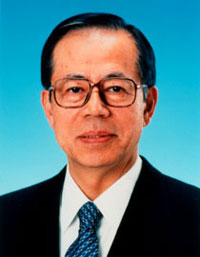Japan starts feverish race for Shinzo Abe's position
Yasuo Fukuda, a dovish former Cabinet secretary, appears to be the leading candidate to replace Japan's Prime Minister Shinzo Abe after his hospitalization.

Fukuda, who served as chief Cabinet secretary under Abe's predecessor, announced his candidacy for the presidency of the ruling Liberal Democratic Party on Friday. The election is Sept. 23.
"This is an emergency situation, so I will do what I must do," Fukuda, 71, told supporters at a Tokyo hotel. "I have a strong sense that I should do this for the country to move Japanese politics forward."
Fukuda, the son of a former prime minister, was the first to officially declare his candidacy. He is considered a staunch supporter of closer ties with China, and opposes prime ministerial visits to a Tokyo war shrine accused of militarism.
He garnered the early support of Foreign Minister Nobutaka Machimura, and media reported popular former Prime Minister Junichiro Koizumi would back him. Finance Minister Fukushiro Nukaga announced Friday he would set aside his own ambitions to be prime minister, and would support Fukuda.
"I am of the same opinion as Fukuda about the importance of relations with Asia, and after talking with him, I decided to throw my support behind him," Nukaga said.
Kyodo News agency, without citing sources, reported former Foreign Minister Taro Aso - the presumed front-runner so far - had said he wanted to run, but had not yet officially declared his intentions. His office said he was set to hold a news conference later in the day, and was widely expected to declare his candidacy then.
"To be clear, I want to run," Kyodo quoted Aso as saying after announcing he relinquished his duties as LDP secretary-general, a post he took last month.
The LDP president is assured of election as prime minister by Japan's parliament, because the party holds a vast majority in the lower house.
Abe, 52, abruptly announced his resignation on Wednesday amid a parliamentary battle over his effort to extend the country's naval mission in the Indian Ocean. Japan is refueling ships there in support of U.S.-led forces in Afghanistan.
On Thursday he checked into a hospital for treatment for psychological stress and exhaustion, and was expected to remain for several days. However, Chief Cabinet Secretary Kaoru Yosano said Abe will hold power until a successor takes charge.
"Although Mr. Abe has expressed his intention to resign, the current Cabinet is responsible for affairs until the new prime minister is inaugurated," Yosano said. "So this means Mr. Abe remains in office until a new prime minister is chosen."
Yosano also attempted to calm nerves over the political uncertainty in Japan, saying administrative reforms initiated in recent years will continue under Abe's successor.
"Whomever is chosen, Japan's reform direction will be maintained in order to maintain prosperity and affluence in the future," he said. Still, he added, a successor might "fine-tune" those policies.
The ruling party, meanwhile, was facing greater pressure to call snap elections for the powerful lower house of parliament. The LDP lost control of the upper house in July elections to the resurgent opposition, led by the Democratic Party of Japan.
Democratic Party of Japan leader Yukio Hatoyama said it was fruitless at this point to allow the LDP to choose the next premier on its own.
"The prime minister will not have the mandate of the people," Hatoyama told reporters. "We should hold elections as soon as possible to judge the will of the public."
Fifty percent of respondents to an Asahi newspaper poll also favored a lower house election - up 11 percentage points from a previous poll at the end of July. The poll of 1,029 people said 41 percent supported the opposition, and 33 percent favored the LDP.
A similar poll taken by the Mainichi newspaper showed 59 percent of 773 respondents favoring a lower house election, up from 53 percent in a late August poll.
Neither poll provided a margin of error.
Abe's spectacular meltdown only a year after taking office was expected to have deep reverberations in upcoming parliamentary debates, and was likely to severely hinder the ruling party's ability to pass an extension of the Afghan mission.
Abe's support ratings in public opinion polls had sagged to about 30 percent, and he will leave behind a government known for scandals and gaffes.
Four of Abe's Cabinet ministers have resigned amid scandals, including one who quit this month just a week after being appointed. An agriculture minister committed suicide over a money scandal in May.
Subscribe to Pravda.Ru Telegram channel, Facebook, RSS!


